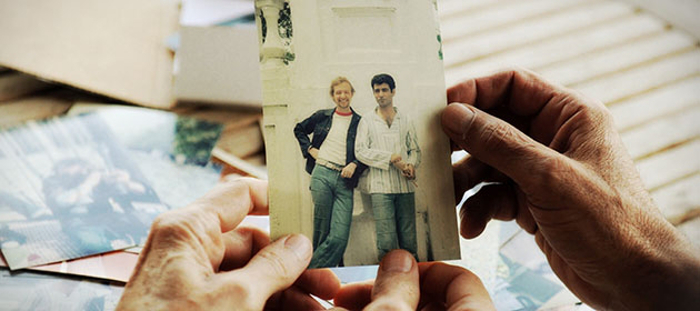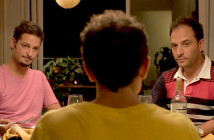Alex & Ali (2014)
Director: Malachi Leopold
Country: USA
Genre: Documentary
Editor’s Notes: The following review is apart of our coverage for Inside Out Toronto: LGBT Film Festival which runs from May 22nd to June 1st. For more information on visit http://www.insideout.ca/ and follow Inside Out on Twitter at @InsideOutTO.
Director/producer Malachi Leopold follows his uncle Alex in a journey to reunite with his long lost Iranian lover, Ali, after thirty-three years of being apart. That statement alone would be sure enough to bring on the waterworks.
Since the revolution, it has been almost impossible for Iranians to immigrate freely to the U.S. or anywhere else for that matter. Thus, Alex and Ali have remained apart since their forbidden romance of the 60s and 70s when Alex was a member of the Peace Corps. The film starts off with Alex nostalgically waxing of his time as a young foreigner in Iran and meeting Ali and his family. They were both hopeful and progressive thinking about the future and the world around them. Even as the two speak over the phone they are tender in their interactions and it’s here where they have found the fortitude to keep their long distance relationship together.
There are really no words to encompass the feeling of reunions of lovers and friends after so many years of separation and the event itself on camera does not disappoint.
In letters, Ali explains that, “The only time I was alive was when I was with you.” Language like this and care of this kind is what provokes Alex to make an effort to reunite with Ali in Turkey. Turkey has been known to be the gay underground railroad for Iranians and it is through here that Alex hopes to convince Ali to leave Iran and live with him in the U.S.. The process itself is very difficult, besides political danger and a very real threat to Ali, Alex has been HIV positive for most of his adult life. Regardless, they are both very eager to see each other.
There are really no words to encompass the feeling of reunions of lovers and friends after so many years of separation and the event itself on camera does not disappoint. The realness of the consequences and complications of their lives stand out in the film. Imagine being apart from your one true love because of who you love, and in a world that not only doesn’t accept that love, but isn’t completely comfortable with who you are?
The history of reunions on film, both fictional and non-fictional, show couples meeting up and riding off with happy tears into the proverbial sunset. In Alex & Ali, Leopold gives the viewer an abashed perspective of the changes that are bound to occur to a relationship over such a long time apart. In many ways, it’s a hard pill to swallow, but one that is handled with delicate camera work displaying sensitivity to the situations that happen before a documentarian’s lens. It’s that gentleness that makes their dire situation all the more palpable, and gives the viewer a genuine feeling of helplessness to the grand injustices of the world when it comes to how we deal with homosexuality.
In Alex & Ali, Leopold gives the viewer an abashed perspective of the changes that are bound to occur to a relationship over such a long time apart.
What struck me the most about this film is that while Leopold didn’t discount his own involvement with the story (he interviews the couple both on and off camera and helps in the investigations to help Ali’s case), he makes sure the story unfolds eventually with him as a helper and lens to his uncle’s story.
Footage of Alex and Ali in Turkey allow for a Westernized view of Ali’s world by showing us the tourist vacation view of Turkey. Yet Ali struggles out loud there with his decision to either go back to Iran or leave with Alex. It’s that ongoing monologue and his quiet gesticulations that demonstrate the true pain of his daily existence. Ali’s two brothers died of cancer and since then he has taken on supporting his nephews, nieces, and parents by taking on several jobs. Not only that, but it is extremely taboo to identify as gay in Iran and the results from doing so can prove to be lethal.
All in all, I applaud Malachi Leopold for taking on the challenging story that hit really close to home for the filmmaker. While we in the West continue to fight for the rights of all to be seen equally, to have the right to marry who they love, and to be who they are freely without prejudice, most people outside our world are still struggling to merely exist.
All in all, I applaud Malachi Leopold for taking on the challenging story that hit really close to home for the filmmaker. While we in the West continue to fight for the rights of all to be seen equally, to have the right to marry who they love, and to be who they are freely without prejudice, most people outside our world are still struggling to merely exist.





